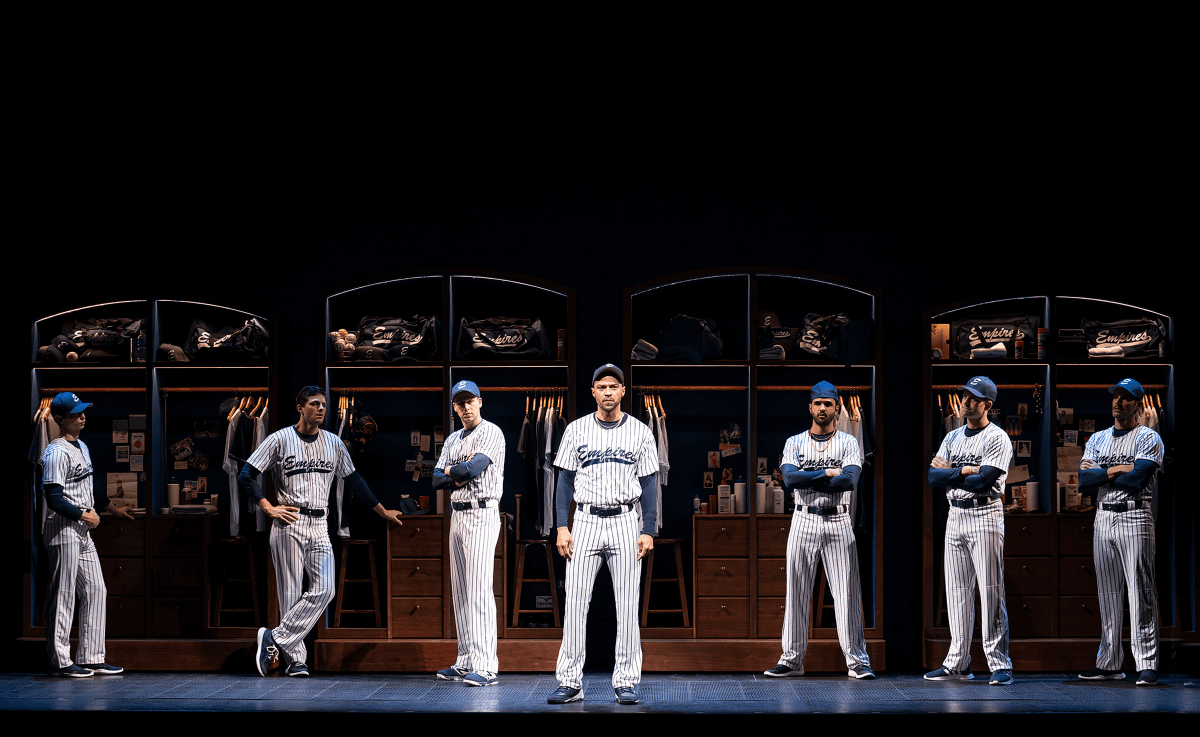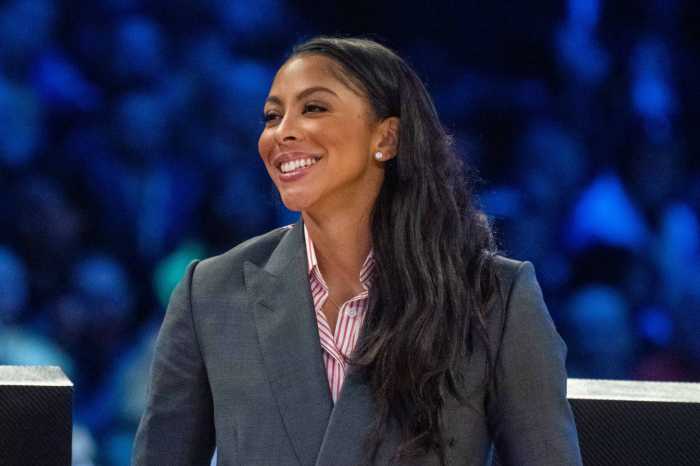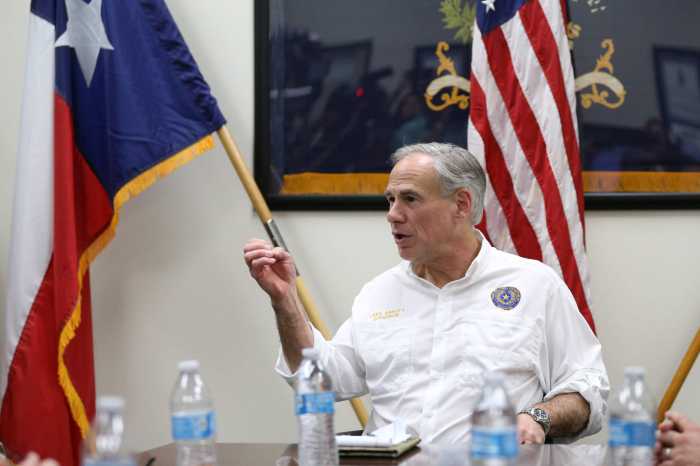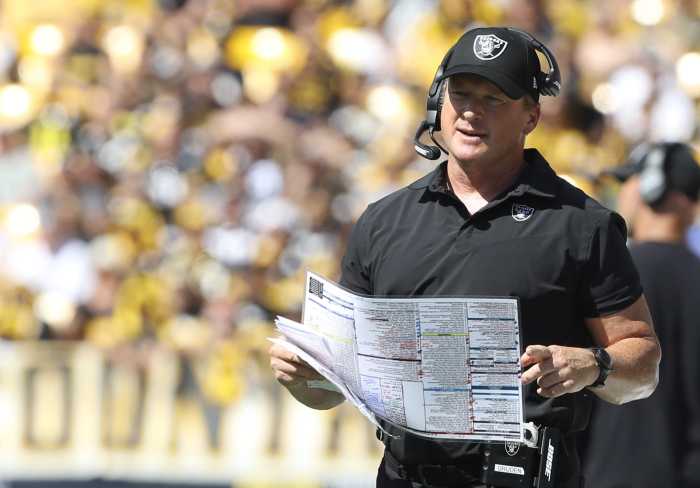When “Take Me Out” debuted at the Public Theater in 2002, it spotlighted a thorny issue — the dearth of openly gay players in Major League Baseball. The play imagined what might happen if a player announced his homosexuality to the world (spoiler alert: it goes horribly wrong). Richard Greenberg’s searing comic drama, which famously featured shower scenes with full-on male nudity, moved to Broadway and won the Tony Award for Best Play, plus the Pulitzer Prize.
Nearly two decades later, one might have hoped that the revival at Broadway’s Hayes Theater would register as a period piece, and that an openly gay pro athlete would no longer get folks’ jock straps in a twist. Incredibly, other than the late Glenn Burke — who was out to many teammates in the 1970s — no active Major League Baseball player has yet dared come out as gay. Apparently, the rampant homophobia both in the locker room and on the playing field is still so toxic, coming out is untenable. The play is set in 2002, but would not be out of place if set in 2022.
In “Take Me Out,” the player in question is no ordinary Joe. His name is Darren Lemming, the winsome, charismatic star centerfielder of the Empire baseball team (think Derek Jeter during the Yankees’ glory days). Women want to date him. Men want to be him. One day, without warning, he casually proclaims his same-sex leanings at a routine press conference.
No stranger to controversy, Darren is biracial and has faced a lifetime of bias and contempt. For this hotshot, played with cool arrogance by TV star Jesse Williams (“Grey’s Anatomy”), sexuality, like skin color, is no big deal. Exuding an “aura of invincible,” he doesn’t care what people think. To everyone else, however, it is a big deal indeed. Soon after his revelation, the first-place team starts losing games, and later, a fluke tragedy occurs.
Not that the drama, directed with precision by Scott Ellis, is only concerned with the politics of sexuality. Greenberg explores intimacy, masculinity, and team dynamics, examining the complex bonds between men no matter their religion, race, or sexual orientation. As befitting a New York team, the Empires are a melting pot featuring Latinx, Asian, Black, and white players, as well as dolts and intellectuals.
“Take Me Out” is narrated by the erudite Kippy Sunderstrom (an appealing Patrick J. Adams), Darren’s best bud on the team, as if he were recounting a doozy of a tale over a few beers. Kippy, married with three kids, isn’t afraid to express his admiration for his hero, and insists the gay “thing” won’t affect their relationship.
Darren develops an odd friendship with his money manager Mason Marzac (Jesse Tyler Ferguson), a gay man who resides in Chelsea yet defies the musclebound “Chelsea Boy” stereotype. Previously a sports avoider, Mason becomes a rabid fan, convinced that America’s national pastime is a grand metaphor for democracy. By play’s end, the rapturous geek is more enamored with the game than the players ever were.
The openly gay Ferguson casts a wry spin on his portrayal of Mitchell on “Modern Family,” a solid fit for the nebbishy Mason. His spirited turn lends a dash of levity to the proceedings. For anyone keeping score, Jesse Williams, as it happens, is openly straight.
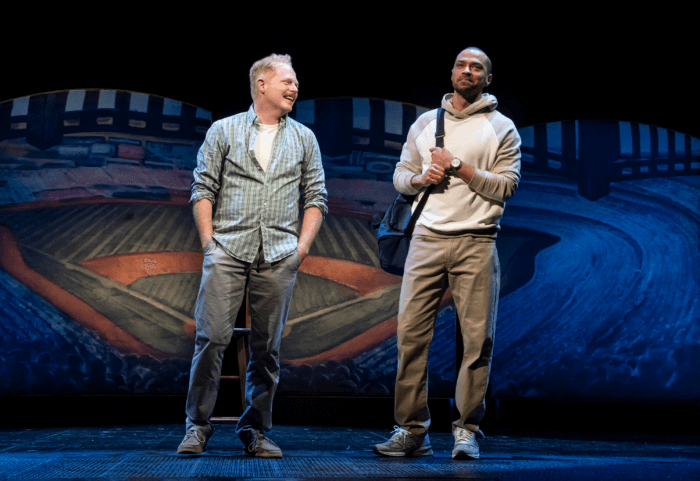
The gay baseball star clashes with the new relief pitcher, Shane Mungitt (Michael Oberholtzer), a dimwit from the Ozarks who has no clue that the term “colored people” is offensive. He does, however, know that “faggot” is hurtful, and wields it like a switchblade against Darren.
Darren’s longtime friendship with Davey Battle (Brandon J. Dirden), a superstar from a competing team, is put to the test. Davey is a devout Christian who believes swearing is a sin, and homosexuality is an abomination best kept under wraps.
Darren’s teammates are flummoxed by the shift in dynamics in the locker room. Suddenly, showering beside another man is freighted with discomfiture. It prompts them to reconsider their own maleness, bringing fears of possible latent same-sex urges to the surface.
“Well, look at us now,” says Kippy. “How we turn from each other. How when we turn to each other we maintain eye contact. Before this wasn’t necessary. We were men.”
The shower scenes, it must be said, are stunning. The total nudity is germane to the plot and highlights the vulnerability, beauty, and humanity of the athletes. And if it makes some theatergoers uneasy, titillated, or insecure, well, that’s partly the point. Patrons, by the way, are required to lock their phones in Yondr pouches lest they become tempted to snap racy photos.
Of course, no one knows how many gay players are in Major League Baseball. Former umpire Dave Pallone surmised in his 1990 autobiography that there were enough closeted gay players to create an All-Star team. There is little reason to think this prevalence does not hold true today.
In June 2021, defensive lineman Carl Nassib made history as the first active NFL player to come out as gay, and went on to play a second season with the Las Vegas Raiders. He was released from his contract last month. Though he admitted the process was painful, he told Outsports that “Representation and visibility are so important.” That includes in theatrical productions like the superbly provocative “Take Me Out,” which helps move the conversation forward. Let’s hope the next Broadway revival is the period piece it deserves to become.
‘TAKE ME OUT” | Second Stage | The Hayes Theater | 240 W. 44th St. | Tue.-Thu. at 7 p.m.; Fri.-Sat. at 8 p.m.; Wed., Sat. at 2 p.m.; Sun. at 3 p.m. | Through Jun. 11 | $79-$199; 2st.com | 2 hrs., 15 mins with intermission

